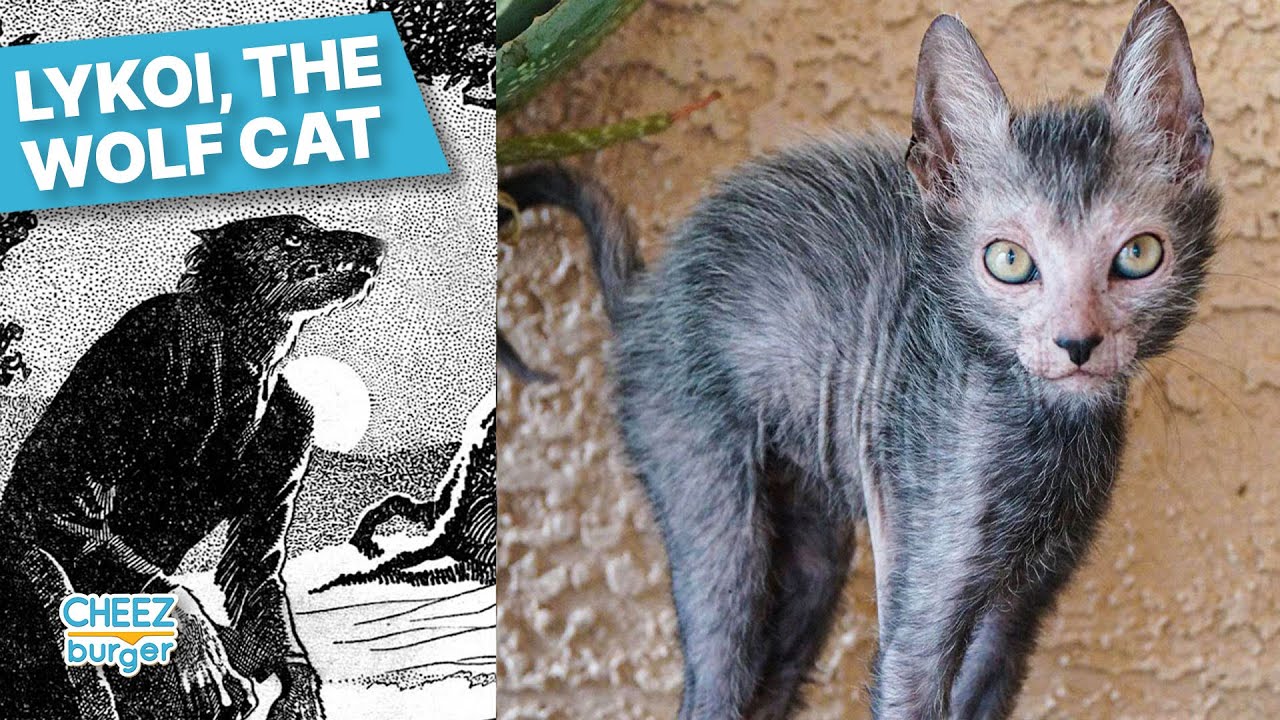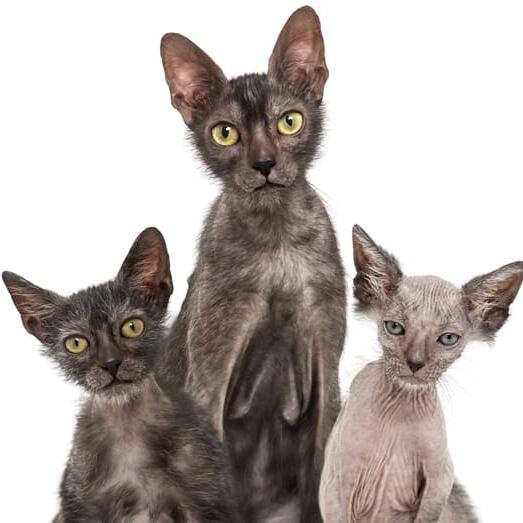Key Takeaways
- The Lykoi cat, known for its “werewolf” appearance, is a result of a natural genetic mutation causing sparse hair growth.
- This breed’s unique name comes from the Greek word “lykos,” meaning wolf, highlighting its distinctive look.
- Lykois are known for their playful, intelligent, and loyal nature, making them a fascinating companion for cat enthusiasts.
- Due to their rarity and careful breeding practices, Lykoi cats can be quite expensive, often costing between $1,500 to $2,500.
- Potential adopters should ensure they’re prepared for the specific care requirements and health monitoring these cats need.
The Lykoi cat, often referred to as the “Wolf Cat” or “Werewolf Cat,” is a unique breed with a fascinating history rooted in genetic mutation. This breed has gained popularity due to its distinct appearance and intriguing background. While adopting a Lykoi can be a rewarding experience, it’s important to be aware of the costs involved and understand why they might be more expensive than other breeds. Additionally, potential adopters should be informed about the breed’s specific health issues and how they compare to other cats. If you’re interested in learning more about adopting unique breeds, you might want to explore calico cats and their adoption process.
Introducing the Lykoi “Wolf” & “Werewolf” Cat
Imagine a cat that looks like it stepped out of a mythical storybook—a creature with a wild, almost magical appearance. That’s the Lykoi cat for you, often affectionately called the “werewolf” cat due to its striking resemblance to the mythical creature. This breed has captured the hearts of many due to its unique looks and enchanting personality.
These cats are not just a visual treat; they have a fascinating backstory. The Lykoi breed emerged from a natural genetic mutation found in domestic short-haired cats. This mutation leads to a partial lack of hair, giving them their signature “werewolf” appearance. Their sparse, roan-patterned coat makes them stand out in any crowd.

“Werewolf Cat …” from m.youtube.com and used with no modifications.
Unique Appearance and Mutation Origins
The Lykoi’s appearance is unlike any other cat breed. Their sparse coat, which can sometimes appear patchy, combined with their often hairless faces and ears, gives them a wild, untamed look. This distinct appearance is due to a genetic mutation that affects the hair follicles, resulting in less hair growth.
Interestingly, this mutation wasn’t artificially created. It was a natural occurrence in domestic cats that breeders noticed and decided to develop further. This spontaneous genetic mutation has led to the Lykoi’s captivating appearance, which resembles that of a werewolf, hence the nickname.
Name Significance and Cultural Origins
The name “Lykoi” itself is steeped in meaning. Derived from the Greek word “lykos,” which translates to “wolf,” the name is a nod to the breed’s wolf-like appearance. This connection to the Greek language and mythology adds an extra layer of allure to the breed, making it all the more intriguing to cat enthusiasts.
- The name highlights the breed’s unique characteristics and mythical allure.
- It connects the cat to the rich tapestry of Greek mythology and culture.
- This naming choice emphasizes the breed’s wild and mysterious nature.
Common Knowledge of Breed and Popularity
The Lykoi cat is not yet a household name, but its popularity is steadily growing among cat lovers. Known for its playful and affectionate nature, the Lykoi has become a sought-after breed for those looking for something a bit different. Its unique appearance and engaging personality make it a standout choice for pet owners seeking a distinctive feline companion.
As more people become aware of the Lykoi, the breed is gaining recognition not only for its looks but also for its endearing traits. They’re known to be intelligent, curious, and loyal, often forming strong bonds with their human families. These characteristics, coupled with their striking appearance, make them a captivating choice for cat enthusiasts.
The History and Roots of the Lykoi Breed
The story of the Lykoi cat begins with a natural genetic mutation that was first observed in domestic short-haired cats. This mutation caused a unique form of hypotrichia, which means reduced hair growth. It’s this genetic anomaly that gives the Lykoi its signature appearance.
Discovery of the Mutation
In 2010, breeders noticed this unusual mutation in a few litters of kittens. Intrigued by their wolf-like appearance, breeders decided to investigate further. Genetic testing confirmed that these cats were not carrying any known hairless genes, indicating that this was indeed a new mutation.
The Role of Selective Breeding
Once the mutation was identified, breeders began the careful process of developing the Lykoi breed. They aimed to maintain the unique appearance while ensuring the cats were healthy and free from genetic issues. Selective breeding played a crucial role in establishing the Lykoi as a recognized breed, with breeders focusing on preserving the distinctive traits while avoiding health problems.
Brittney Gobble’s Contribution to Development
Brittney Gobble, a key figure in the development of the Lykoi breed, played an instrumental role in its recognition. Her dedication to the breed’s development and her careful breeding practices helped establish the Lykoi as a unique and healthy breed. Thanks to her efforts, the Lykoi cat is now recognized by several cat associations, allowing more people to appreciate and adopt these fascinating creatures.

“Lykoi Cat Breed Information| Purina” from www.purina.co.uk and used with no modifications.
Identifying Characteristics of Lykoi Cats
The Lykoi cat is easily identifiable due to its distinctive features. From its sparse coat to its unique facial features, the Lykoi is a breed that stands out in a crowd. But what exactly makes these cats so special?
Physical Traits: Sparse Coat and Facial Features
The Lykoi’s coat is one of its most defining features. The sparse, roan-patterned fur gives it a wild, untamed appearance. Unlike other breeds, the Lykoi’s coat can appear patchy, especially on the face and ears, adding to its wolf-like look. This unique coat pattern is a direct result of the genetic mutation that defines the breed.
Besides their coat, Lykoi cats have other distinctive physical traits. Their large, hairless ears and bright, inquisitive eyes give them an alert and intelligent expression. These features, combined with their unique coat, make them instantly recognizable.
Distinctive Behavior and Personality
Lykoi cats are not just about looks; their personality is equally captivating. They are known for being highly intelligent and curious, always eager to explore their surroundings. This makes them excellent companions for those who enjoy interactive play and mental stimulation with their pets. For more information on their unique traits, you can read about the Lykoi cat breed.
Moreover, Lykois are incredibly loyal to their human families. They form strong bonds and often follow their owners around the house, keen to be involved in daily activities. This loyalty makes them wonderful pets for families and individuals alike, as they thrive on companionship and interaction.
“Lykoi cats are like little detectives. They love to investigate new things and are always on the lookout for the next adventure. Their curiosity and intelligence make them a joy to have around the house.” – A Lykoi owner
Despite their wild appearance, Lykois are generally affectionate and enjoy spending time with their human companions. They are known to be playful, often engaging in games that challenge their agility and intellect. This combination of traits makes them a unique and rewarding pet to have.
The Cost of Lykoi Cats and Why They’re Expensive
Owning a Lykoi cat can be a significant investment. Due to their rarity and the specialized breeding practices required to maintain their unique traits, Lykoi cats often come with a hefty price tag. Prospective owners should be prepared for this financial commitment.
Factors Influencing Price
Several factors contribute to the high cost of Lykoi cats. Firstly, their rarity means that there are limited numbers available, driving up demand and, consequently, the price. Additionally, the costs associated with responsible breeding practices, such as genetic testing and health screenings, add to the overall expense.
Rareness and Breeding Challenges
Breeding Lykoi cats is not without its challenges. Maintaining the breed’s unique genetic mutation while ensuring the cats are healthy requires careful selection and breeding practices. This meticulous process means that there are fewer Lykoi cats available, contributing to their scarcity and high cost.
Moreover, breeders must ensure that they are not introducing any genetic health issues into the breed. This involves rigorous testing and careful selection of breeding pairs, further adding to the complexity and cost of breeding Lykois.
Ethical Breeding Practices and Health Guarantees
Responsible breeders prioritize the health and well-being of their cats above all else. This means adhering to ethical breeding practices and providing health guarantees for their kittens. Potential owners should seek out breeders who are transparent about their breeding practices and who offer assurances regarding the health of their cats.
By choosing a reputable breeder, prospective Lykoi owners can ensure they are getting a healthy cat that has been bred responsibly. This not only protects the integrity of the breed but also ensures that the new pet will be a healthy and happy addition to the family. For those considering other options, it’s also worth exploring the myths and facts about pet adoption to make an informed decision.
Health Issues and Care for Lykoi Cats
Like all cats, Lykois require regular care and attention to ensure they remain healthy. While they are generally robust, there are specific health considerations that potential owners should be aware of.
Understanding these health issues and knowing how to care for a Lykoi cat properly can help ensure a long and healthy life for these unique pets.
Common Health Concerns
Due to their unique genetic makeup, Lykoi cats may be prone to certain health issues like obesity, even though that may be hard to believe from how skinny they look in the photos we selected. While they are generally healthy, it’s important to monitor them for any signs of skin conditions or allergies and they can be susceptible to sunburns, which can be more common due to their sparse coats.
Regular veterinary check-ups are essential to catch any potential health issues early. Keeping up with vaccinations and routine health screenings can help ensure that your Lykoi cat remains in good health throughout its life.
Proper Grooming and Maintenance
Despite their sparse coats, Lykoi cats do require some grooming to keep their skin and fur in good condition. Regular brushing can help remove loose hairs and prevent matting, while also providing an opportunity to check for any skin issues.
Additionally, regular bathing may be necessary to keep their skin clean and healthy. It’s important to use gentle, cat-friendly products to avoid irritation.
Importance of Regular Vet Visits
Regular veterinary visits are crucial for maintaining the health of a Lykoi cat. These check-ups allow for early detection of any potential health issues and ensure that your cat is up to date with vaccinations and preventative care.
By keeping up with regular vet visits, you can help ensure that your Lykoi cat remains healthy and happy, enjoying a long and fulfilling life as part of your family.
Comparing Lykoi Cats to Other Breeds
When comparing Lykoi cats to other breeds, their unique appearance and personality traits stand out. Unlike many other breeds, Lykois have a distinctive look that sets them apart, along with a playful and curious nature that makes them a joy to have as pets.
Their loyalty and intelligence are also notable, making them excellent companions for those who enjoy interactive play and mental stimulation with their pets.
In terms of care, Lykois may require more attention due to their specific grooming needs and health monitoring. However, for those willing to invest the time and effort, the rewards of owning a Lykoi cat are plentiful.
Differences in Appearance and Behavior
- Lykoi cats have a sparse, roan-patterned coat, unlike the dense fur of many other breeds.
- Their wolf-like appearance is unique, with hairless patches on the face and ears.
- Behaviorally, they are highly curious and intelligent, often more so than other breeds.
- They form strong bonds with their human companions, showing loyalty and affection.
These differences make Lykoi cats a distinctive and rewarding choice for cat enthusiasts looking for something a bit different from the norm. By understanding these unique traits and needs, potential owners can ensure they are prepared to provide the best care for their Lykoi cat, resulting in a fulfilling and enjoyable companionship.
Impact on Modern Feline Breeding Practices
The emergence of the Lykoi cat has influenced modern feline breeding practices significantly. Breeders have learned the importance of preserving natural mutations while ensuring the health and well-being of the cats. This has led to a greater emphasis on genetic testing and ethical breeding practices across the board.
Moreover, the Lykoi’s unique appearance has sparked interest in exploring other naturally occurring mutations in cats. Breeders are now more open to investigating and developing new breeds that may arise from natural genetic variations, as long as they can ensure the health and sustainability of the breed.
Adopting a Lykoi Cat
“Adopting a Lykoi cat is like bringing a piece of living mythology into your home. Their unique appearance and engaging personality make them a truly special addition to any family.” – A Lykoi breeder
If you’re considering adopting a Lykoi cat, it’s important to be well-informed and prepared for the responsibilities that come with owning such a unique pet. From finding reputable breeders to preparing your home, there are several steps to ensure a smooth adoption process.
Understanding the specific needs and characteristics of the Lykoi will help you provide the best care and environment for your new feline companion.
Finding Reputable Rescue Groups
When looking to adopt a Lykoi cat, it’s crucial to find a reputable breeder or rescue organization. Responsible breeders prioritize the health and well-being of their cats, ensuring they are free from genetic issues and are well-socialized before adoption.
Start by researching breeders who are recognized by cat associations such as The International Cat Association (TICA) or the Cat Fanciers’ Association (CFA). These organizations often have lists of accredited breeders who adhere to strict ethical guidelines and may be involved directly or indirectly with adoption placement networks. For additional insights, consider exploring best practices for pet rescue organizations to ensure you’re making informed decisions.
Preparing Your Home for a Lykoi
Once you’ve decided to adopt a Lykoi, it’s time to prepare your home for their arrival. Lykois are curious and playful, so creating a safe and stimulating environment is essential.
Ensure that your home is cat-proofed, removing any potential hazards such as loose wires or toxic plants. Provide plenty of toys and climbing structures to keep your Lykoi entertained and engaged.
Responsibilities of Lykoi Ownership
Owning a Lykoi cat comes with specific responsibilities that are crucial for their well-being. From regular grooming to providing mental stimulation, understanding these responsibilities will help you be a better pet parent.
Regular veterinary check-ups are essential to monitor their health and catch any potential issues early. Additionally, maintaining a balanced diet and providing plenty of opportunities for exercise will keep your Lykoi healthy and happy.
Moreover, Lykois thrive on interaction and companionship. Make sure to spend quality time with your cat, engaging in play and providing affection to strengthen your bond.
- Regular grooming and bathing to maintain their skin and coat.
- Routine veterinary visits for health monitoring.
- Providing a balanced diet and fresh water at all times.
- Ensuring plenty of mental and physical stimulation.
- Offering love and companionship to foster a strong bond.
Frequently Asked Questions (FAQ)
As a potential Lykoi owner, you may have several questions about this unique breed. Here are some of the most commonly asked questions to help you better understand the Lykoi cat.
What is the origin of the Lykoi cat?
The Lykoi cat originated from a natural genetic mutation found in domestic short-haired cats. This mutation, which causes sparse hair growth, was first observed in 2010. Breeders then developed the Lykoi breed by selectively breeding these unique cats while ensuring their health and well-being.
Are Lykoi cats hypoallergenic?
No, Lykoi cats are not considered hypoallergenic. While they have a sparse coat, they still produce dander, which is the primary allergen in cats. Those with cat allergies should spend time with a Lykoi before adopting to ensure they don’t have an allergic reaction.
Do Lykoi cats require special grooming?
Yes, Lykoi cats do require some special grooming due to their sparse coats. Regular brushing helps remove loose hairs and prevents matting. Additionally, occasional bathing is necessary to keep their skin clean and healthy, using gentle, cat-friendly products to avoid irritation.
Are there any health issues with Lykoi mixed breeds?
While Lykoi mixed breeds can be healthy, it’s important to ensure that they are free from genetic issues. Responsible breeding practices and regular veterinary check-ups can help prevent potential health problems. As with any breed, mixed or purebred, monitoring their health and providing proper care is essential. For more information on health issues in cats, you can read about calico cats and their health concerns.
In conclusion, adopting a Lykoi cat can be a rewarding experience for those who appreciate their unique appearance and engaging personality. By understanding their specific needs and responsibilities, you can provide a loving and enriching environment for your new feline friend.


